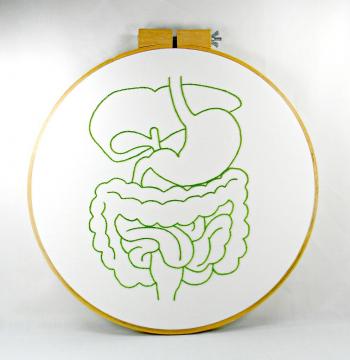21 June 2016 - Nutraingredients - Loss of diverse gut bacterium may cause autistic behaviours

This study entertains the possibility that probiotic treatment can be beneficial in ‘restoring’ certain behaviours in autism and other neurodevelopmental conditions.
FAB RESEARCH COMMENT:
This study builds on previous research showing that gut microbes can influence not only general health, but brain development and behaviour - and that disturbances to the gut microbiota may contribute to some of the behaviours and symptoms of autism and related conditions.The researchers also drew on earlier findings showing that children of obese mothers have higher risks for autism and other neurodevelopmental disorders, because changes to the gut microbiota from consuming high-fat, high-sugar diets are thought to contribute to these links.
Findings showed that
1) different maternal diets led to clear differences in the gut microbiota of the offspring
2) the gut microbial profile associated with the 'high-fat' maternal diet also predicted impaired social behaviours in the offspring, but importantly:
3) restoration of normal gut microbiota in the offspring normalised their social behaviour
Obviously, findings from animal studies do not always generalise to humans - but these results provide further clear evidence that dietary factors can affect brain and behaviour via their effects on gut microbes.
See the associated research here:
The absence of one specific bacterial species in the gut is associated with the development of social behaviour that falls within a range of autism spectrum disorders (ASDs), according to a study in mice.
The findings lay bare the impact an imbalanced microbial community may have on the host and further confirms diet from birth in the establishment, growth and maintenance of microbial diversity in the gut ecosystem.
While it remains to be seen if the findings apply to humans, the researchers believe it is an exciting way of affecting the brain from the gut.
Writing in the journal Nutrition and Diabetes, the team demonstrated that not only was the absence of the bacterial species Lactobacillus reuteri detrimental to the host, but adding this species back to the guts of affected mice was enough to reverse some of the mice’s behavioural deficits.
These latest results mirror human epidemiological studies that have found maternal obesity during pregnancy could increase children’s risk of developing neurodevelopmental disorders, including ASDs. In addition, some individuals with ASD also report recurring gastrointestinal problems.
The study
Adding the bacterial species, Lactobacillus reuteri back to the guts of affected mice was enough to reverse behavioural deficits.(© iStock.com)
The research team led by Dr Mauro Costa-Mattioli of Baylor University began by raising around 60 female mice on a high-fat diet. A control group of female mice fed on a normal diet was also included.
After bearing a number of offspring, these young were then weaned onto a normal diet. After a month, these offspring began exhibiting behavioural abnormalities, like spending less time in contact with their peers and not initiating interactions.
“We used gene sequencing to determine the bacterial composition of their gut,” said first author Shelly Buffington, a postdoctoral fellow in Costa-Mattioli’s lab.
“We found a clear difference in the microbiota of the two maternal diet groups.”
“The sequencing data was so consistent that by looking at the microbiome of an individual mouse we could predict whether its behaviour would be impaired.”
When socially impaired three-week-old mice were paired with 'normal' mice, a full restoration of the gut microbiome and an improvement in behaviour were observed within one month.
Faecal exchange
Researchers pointed towards the transfer of faecal matter between each animal. As mice eat each other’s faeces both groups were housed together in order for the socially-deficient mice to acquire a more diverse range of gut microbiota.
This has been observed in previous studies in which faecal-transplants in mice without gut microbiota provided causal proof that a disrupted microbial ecosystem in mice born to mothers on a high-fat diet may be the cause of their social deficits.
The missing bacterial species Lactobacillus reuteri was identified via whole-genome sequencing and was reduced more than nine-fold in number in the microbiome of the socially awkward mice.
“We found that in response to social interaction there was a lack of synaptic potentiation in a key reward area of the brain that could be seen in the normal control mice,” Costa-Mattioli noted.
“When we put the bacteria back in the maternal high-fat-diet offspring, we could also restore the changes in synaptic function in the reward circuitry.”
Probiotic development
"This study entertains the possibility that probiotic treatment can be beneficial in ‘restoring’ certain behaviours in autism and other neurodevelopmental conditions."
Of particular note is the use of a human-sourced bacterial species to promote oxytocin levels and improve social behavioural deficits in deficient mice.
The team thought this could be a platform in which a probiotic intervention could be developed for the treatment of neurodevelopmental disorders in humans.
